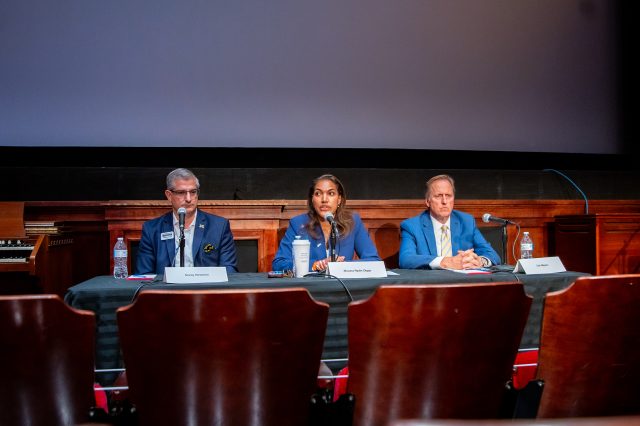[ad_1]
The three non-incumbent University of Michigan Board of Regents candidates Shauna Ryder Diggs (D), Carl Meyers (R), Sevag Vartanian (R) attended a community forum hosted by the Faculty Senate Office Tuesday evening. The candidates answered faculty-solicited questions as well as questions from the audience of 50 U-M community members.
Each candidate answered the same set of questions. The first question asked the candidates how they felt about the changes to the Statement of Student Rights and Responsibilities made in July, along with the newly passed institutional neutrality bylaw. Diggs said that she believes faculty committees should be formed to participate in making these kinds of decisions for the U-M community.
“(A faculty) committee should be asking the faculty senate what their thoughts are,” Diggs said. “That committee should be asking students what their thoughts are, should be looking at the data, asking the experts on campus what their thoughts are, should be asking experts around the country and around the world what their thoughts are. Then that committee that’s looked at something for six to eight months then goes and gives the final report that includes all of the information from the stakeholders.”
Vartanian responded to the question with a focus on the preservation of the right to free speech, emphasizing his disapproval of the institutional neutrality bylaw.
“I really think (the bylaw) is just a cop out,” Vartanian said. “We have all these experts that should be having the debates and talking about it. There are two options for someone that doesn’t want to answer a question. One, they could say, ‘I have my personal views on this matter that I don’t want to discuss,’ and two, ‘according to the principle of institutional neutrality, I’m not going to take a stand on that.’”
The candidates then moved to a question on what actions the University could take to prioritize its diversity, equity and inclusion goals. Diggs pointed to her work during her previous terms as a regent from 2012 to 2020, during which she supported the establishment of the Go Blue Guarantee.
“One of the things we did when I was a regent was start the Go Blue Guarantee, which provided free tuition for families before making $50,000 or less,” Diggs said. “What it really did was encourage people who think they don’t belong here to apply.”
Vartanian sees the Go Blue Guarantee as ineffective in achieving its goal, and expressed his support for a more quantitative approach to the University’s DEI goals.
“This Go Blue Guarantee was a means to get more qualified, diverse students in, and it’s really bringing in … a lot more rural white guys,” Vartanian said. “If we can’t quantify (DEI), how are we going to know when we’ve met our goals? So, let’s try applying the scientific method to that whole process.”
Meyers disagreed and instead advocated for expanding the Go Blue Guarantee to more middle class families.
“Not all families making $75,000 are equal,” Meyers said. “Some may have four children where the parents are working two jobs. Some have one child where there’s one parent working. (The Go Blue Guarantee) has to be expanded. It has to, and we have to give assistance to the middle class.”
The final question asked candidates about the leaked audio recording of University President Santa Ono, in which Ono said he believed the U.S. Congress’ attention was more heavily focused on antisemitism rather than Islamophobia. Vartanian said he sees this as an opportunity for the University and Ono specifically to stand up for itself.
“This provides President Ono with an incredible opportunity to show what kind of leader he is,” Vartanian said. “Will he do what is right and fight against antisemitism and … Islamophobia, or will he pick a side and take the funding? We teach our kids to stand up to bullies. The University of Michigan should be leading by example.”
Meyers said he agrees that the University has to advocate for itself against Congress.
“(Congress’) only goal is to get reelected, and they’ll use every opportunity,” Meyers said. “But we were here before they got to Congress, and the University of Michigan will be here after they leave Congress. I think we have to stick up for ourselves a lot better.”
Daily Staff Reporter Matthew Shanbom can be reached at shanbom@umich.edu.
Related articles
[ad_2]
Source link











